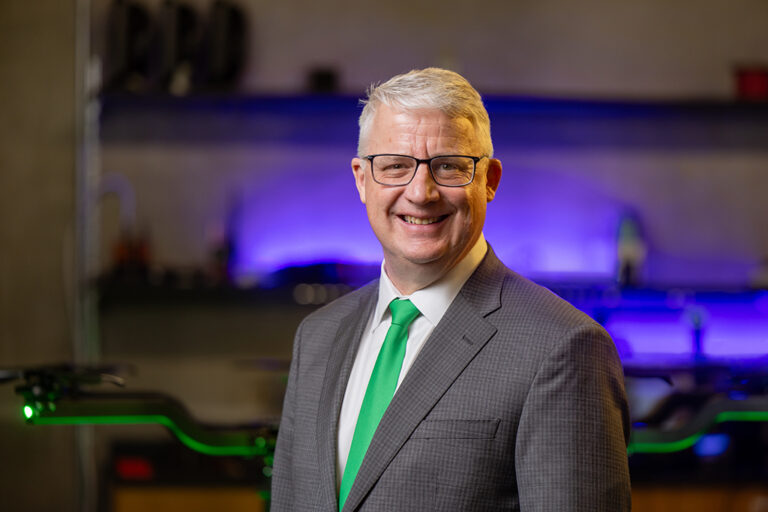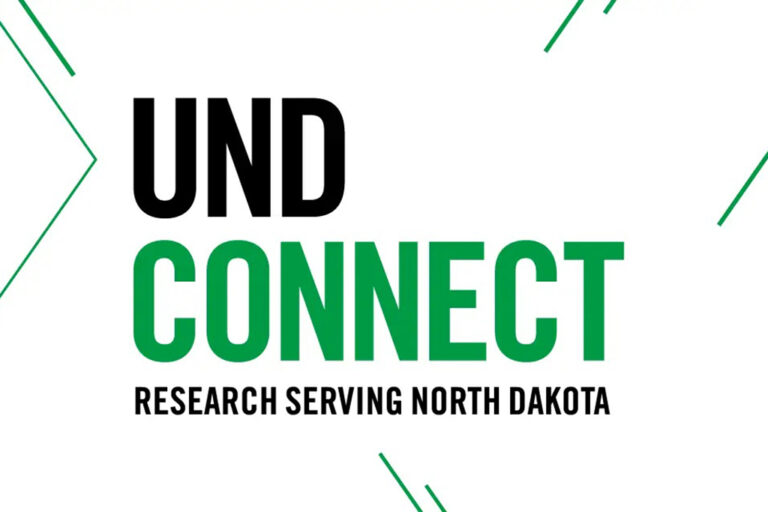The ultimate elevator pitch
UND grad students get three minutes max to showcase their research in non-technical terms

Matt Gilmore knew he was onto a good thing when he learned about an Australian university’s Three Minute Thesis (3MT®) competition for graduate students that focused on communication skills.
With his colleague Chris Nelson, a faculty member in English — part of the UND College of Arts and Sciences — he organized UND’s very first 3MT competition, held at the Gorecki Alumni Center earlier this month. Gilmore and Nelson recruited several teams of volunteer judges from among UND faculty, students, and community members.
Winners
Six students out of 24 competitors advanced from the preliminary competition last Friday to Monday’s final round at the Gorecki Alumni Center. UND President Mark Kennedy and Provost and Vice President for Academic Affairs Thomas DiLorenzo were on hand to congratulate the winners.
“The skill that this competition encourages is one of the most vital career skills that you can develop,” said Kennedy, noting that he advanced early and fast in his corporate career by being able to deliver crisp, clear communication on technical subjects. He addressed the audience during the awards event.
Brooke Hagenhoff, a master’s degree student in atmospheric sciences, won first place.
“It’s essential to be able to explain your work not only to the people around you but to the general public so they can understand what you do and why it’s so important,” said Hagenhoff, a Jefferson City, Mo., student whose winning presentation was titled “When Do Weather Models Misbehave?”
Matt Fuka, a master’s degree student in mechanical engineering, won both second place and People’s Choice awards.
“3MT helped me to present my work to other people in daily life so they can understand it,” said Fuka, a Grand Forks native whose presentation was titled “Creating Materials for Oil-Free Engines.”
DiLorenzo echoed the student perspective on the competition during his award ceremony remarks.
“It’s incredibly ironic as we go through graduate training that we get more and more narrow, more and more specific,” DiLorenzo said. “But fewer people understand us. So having the opportunity to prepare for a broader lay audience is incredibly important for all of us. As we carry around these little supercomputers [our smartphones], holding someone’s attention briefly is all the time we get. We get a brief few minutes to sell our idea to someone.”

What it’s all about
The contest was about students addressing non-specialists with compelling stories about their research in three minutes or less. Communicating science is a key interest of Gilmore, an associate professor of atmospheric sciences in the John D. Odegard School of Aerospace Sciences.
“We need to make sure graduate students are able to talk about their research — communicate clearly what they have done — so when they get out of school, they are marketable,” said Gilmore, whose courses include one about science communication. “They can get a job because they can explain to their future employer what they did, and the employer will actually understand it.”
3MT helped in that effort, says Gilmore.
“3MT is important for graduate education and the communication of the kinds of research that is done here and across the world,” Nelson said. “Many of our grants are federally funded, so we have a certain responsibility to the taxpayer to communicate the research they are funding here at the University: its significance, its value, what it contributes to the community.”
“The competitors were allowed one visual,” said Gilmore. “That visual could be a diagram, photograph or collage that is interesting to the audience and supports the speech.”
In addition to their supporting visual, competitors were judged on how well they captured the attention of the audience, how engaged they were with the audience, how much energy they brought to the presentation, and how clearly they articulated their ideas.
“This competition was a challenge for every student competitor for two reasons,” Gilmore said. “It’s easier to get up and give an hour-long talk to one’s department or research colleagues because you have more time to go into the details and can use jargon to convey complex ideas.”
“But it’s much harder to distill your research to only three minutes,” he continued, “because not only do you have to determine the most important message, but you also have to find different words or analogies, in place of jargon, that will resonate with your layperson audience.”
The 24 competitors were selected by their graduate program directors in academic areas ranging from English to engineering. Many had practiced and received feedback from trainers and fellow students over the past five weeks.

About 3MT®
This is a growing and significant competition throughout the world. It was originally developed by the University of Queensland (Australia). It is especially important as an act of public scholarship highlighting the exciting research of our graduate students to various UND stakeholders.
In addition to enhancing the students’ ability to communicate the importance of their research to various publics, the competition also provides incentives for participation, including cash awards provided by UND’s School of Graduate Studies.
The UND 3MT® was cosponsored by UND School of Graduate Studies and the Division of Research and Economic Development. Gilmore and Nelson say they plan to stage another round of 3MT competition next year.
— Juan Pedraza, Office of the Vice President for Research & Economic Development


